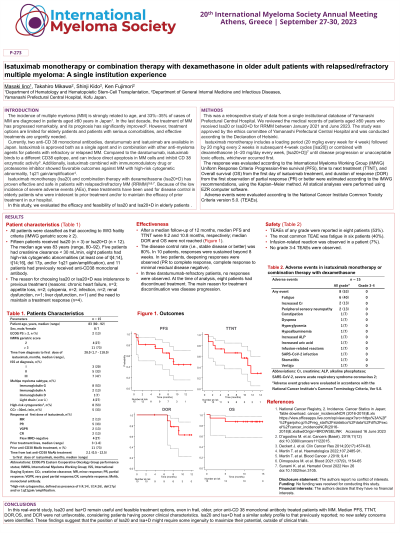Treatment of Relapsed/Refractory Myeloma
Poster Session 2
P-273: Isatuximab monotherapy or combination therapy with dexamethasone in older adult patients with relapsed/refractory multiple myeloma: a single institution experience
Thursday, September 28, 2023
12:30 PM - 1:30 PM EEST


Masaki Iino, MD
Director in Dpt. of Hematology and Hematopoietic Stem-cell Transplantation
Yamanashi Prefectural Central Hospital
Kofu, Yamanashi, Japan
Introduction: Isatuximab monotherapy (20 mg/kg div, Isa20) or combination therapy with dexamethasone (Isa20+D) has proven effective and safe in patients with relapsed/refractory multiple myeloma (RRMM). Because of the low incidence of severe adverse events, these treatments have been used for disease control in older adult patients who are intolerant to prior treatment and/or to maintain the efficacy of prior treatment in our hospital. In this study, we retrospectively evaluated the efficacy and safety of Isa20 and Isa20+D in older adult patients.
Methods: We examined the efficacy and safety of Isa20 and Isa20+D using the medical records of RRMM patients aged ≥ 80 years, who were treated at our hospital between 2021 and 2023. The response was evaluated according to the International Myeloma Working Group Uniform Response Criteria. Median overall survival (OS) and time to next treatment (TTNT) were estimated using the Kaplan–Meier method. Adverse events were evaluated according to the National Cancer Institute Common Toxicity Criteria version 5.0. The study was approved by the ethics committee of Yamanashi Prefectural Central Hospital and was conducted in accordance with the principles of the Declaration of Helsinki.
Results: Fifteen patients received either Isa20 (n = 3) or Isa20+D (n = 12). The patient characteristics at diagnosis were: a median age of 83 years (range, 80–92), a male to female ratio of 8:7, and International Staging System stages I/II/III = 3:5:7 patients. The median number of prior treatments was three. Five patients had creatinine clearance < 30 mL/min, eight patients had high-risk cytogenetic abnormalities (at least one of t[4;14], t[14;16], del 17p, or 1q21 gain/amplification), and eleven patients had previously received daratumumab. All patients were classed as frail according to the International Myeloma Working Group Frailty Criteria. The reason for choosing Isa20 or Isa20+D treatment was intolerance to previous treatment (because of chronic heart failure, three patients; appetite loss, two patients; cytopenia, two patients; infection, two patients; renal dysfunction, one patient; liver dysfunction, one patient) and the need to maintain a treatment response (four patients). The disease control rate (i.e., stable disease or better) was 80%. After a median follow-up period of 10 months, the median TTNT was 7.5 months. The median OS was not reached. At the time of analysis, eight patients had discontinued treatment. The main reason for treatment discontinuation was disease progression. Regarding adverse events, an infusion reaction was extremely rare and no unexpected adverse events were identified in this study.
Conclusions: Isa20 and Isa20+D remain useful and feasible treatment options in a real-world setting, even in frail older adult patients with RRMM.
Methods: We examined the efficacy and safety of Isa20 and Isa20+D using the medical records of RRMM patients aged ≥ 80 years, who were treated at our hospital between 2021 and 2023. The response was evaluated according to the International Myeloma Working Group Uniform Response Criteria. Median overall survival (OS) and time to next treatment (TTNT) were estimated using the Kaplan–Meier method. Adverse events were evaluated according to the National Cancer Institute Common Toxicity Criteria version 5.0. The study was approved by the ethics committee of Yamanashi Prefectural Central Hospital and was conducted in accordance with the principles of the Declaration of Helsinki.
Results: Fifteen patients received either Isa20 (n = 3) or Isa20+D (n = 12). The patient characteristics at diagnosis were: a median age of 83 years (range, 80–92), a male to female ratio of 8:7, and International Staging System stages I/II/III = 3:5:7 patients. The median number of prior treatments was three. Five patients had creatinine clearance < 30 mL/min, eight patients had high-risk cytogenetic abnormalities (at least one of t[4;14], t[14;16], del 17p, or 1q21 gain/amplification), and eleven patients had previously received daratumumab. All patients were classed as frail according to the International Myeloma Working Group Frailty Criteria. The reason for choosing Isa20 or Isa20+D treatment was intolerance to previous treatment (because of chronic heart failure, three patients; appetite loss, two patients; cytopenia, two patients; infection, two patients; renal dysfunction, one patient; liver dysfunction, one patient) and the need to maintain a treatment response (four patients). The disease control rate (i.e., stable disease or better) was 80%. After a median follow-up period of 10 months, the median TTNT was 7.5 months. The median OS was not reached. At the time of analysis, eight patients had discontinued treatment. The main reason for treatment discontinuation was disease progression. Regarding adverse events, an infusion reaction was extremely rare and no unexpected adverse events were identified in this study.
Conclusions: Isa20 and Isa20+D remain useful and feasible treatment options in a real-world setting, even in frail older adult patients with RRMM.
